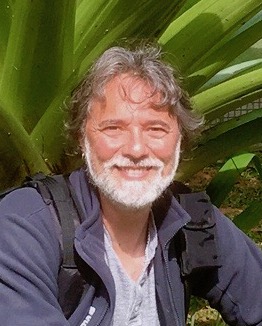Research
My research interests are fairly broad, but revolve around biological interactions and community ecology. I’m interested in how local to global environmental change affects biological interactions, community diversity and ecosystem functions. I mostly focus on freshwater invertebrate populations and communities, but I also collaborate on works that deal with fish, terrestrial insects, and plant-insect interactions. My favorite projects take advantage of a natural ecosystem that is small and contained (allowing complete sampling of the organisms), widely distributed (allowing to test the generality of results over broad biogeographic gradients), and viewed by ecologists as a model system for testing ecological theory: the rainwater-filled leaves of Neotropical tank bromeliads and their aquatic food web. In recent-ongoing projects that make use of tank-bromeliads as model system, I aim at understanding how different scales of biological organisation, organisms, functional community structure, metacommunity, and their interactions, drive community re-assembly and multifunctional resilience in neotropical ecosystems, following drought events that range from the current norm to extreme events and predictions of IPCC.
Teaching
At University Toulouse 3 Paul Sabatier, I mostly teach Zoology, and Animal Diversity & Evolution
Responsabilities, other activities
- Director of CRBE
- Associate Editor, International Journal of Limnology
- Conseiller Scientifique, International Foundation For Science, Stockholm, Suède
List of selected publications
Séguigne M, Leroy C, Carrias J-F, Corbara B, Lafont Rapnouil T, Céréghino R. 2024. Interactive effects of drought and deforestation on multitrophic communities and aquatic ecosystem functions in the Neotropics—a test using tank bromeliads. PeerJ 12:e17346
Srivastava D.S., MacDonald A.A.M., Pillar V.D., Kratina P., Debastiani V.J., Guzman L.M., Trzcinski M.K., Dézerald O., Barberis I.M., de Omena P.M., Romero G.Q., Ospina Bautista F., Marino N.A.C., Céline Leroy C., Farjalla V.F., Richardson B.A., Gonçalves A.Z., Corbara B., Petermann J.S., Richardson M.J., Melnychuk M.C., Jocqué M., Ngai J.T., Talaga S., Piccoli G.C.O., Montero G., Kirby K.R., Starzomski B.M., Céréghino R. 2022. Geographical variation in the trait-based assembly patterns of multitrophic invertebrate communities. Functional Ecology, 37 (1), 73-86
Céréghino R., Trzcinski M.K., MacDonald A.A.M., Marino N.A.C., Acosta Mercado D., Leroy C., Corbara B., Romero G.Q., Barberis I.M., Dézerald O., Hammill E., Atwood T.B., Piccoli G.C.O., Farjalla V.F., Ospina Bautista F., Carrias J.F., Leal J.S., Montero G., Antiqueira P.A.P., Freire R., Realpe E., Amundrud S.L., de Omena P.M., Campos A.B.A., Srivastava D.S. 2022. Functional redundancy dampens precipitation change impacts on species-rich invertebrate communities across the Neotropics. Functional Ecology 36: 1559-1572
Bonhomme C., Céréghino R., Carrias J.F., Compin A., Corbara B., Jassey V., Leflaive J., Farjalla V.F., Marino N.A.C., Rota T., Srivastava D.S., Leroy. C. 2021. In situ resistance, not immigration, supports invertebrate community resilience to drought intensification in a neotropical ecosystem. Journal of Animal Ecology 90:2015–2026
Hamard S., Céréghino R., Barret M., Sytiuk A., Lara E., Dorrepaal E., Kardol P., Küttim M., Lamentowicz M., Leflaive J., Petchey O., Le Roux G., Tuitila E.S., Jassey V.E.J. 2021. Contribution of microbial photosynthesis to peatland carbon uptake along a latitudinal gradient. Journal of Ecology 109: 3424-3441
Céréghino R., Françoise L., Bonhomme C., Carrias J.F., Compin A., Corbara B., Jassey V., Leflaive J., Rota T., Farjalla V., Leroy C. 2020. Desiccation resistance traits predict freshwater invertebrate survival and community response to drought scenarios in a Neotropical ecosystem. Ecological Indicators 119: 106839
Desquilbet M., Gaume L., Grippa M., Céréghino R., Humbert J.F., Bonmatin J.M., Cornillon P.A., Maes D., Van Dyck H., Goulson D. 2020. Comment on “Meta-analysis reveals declines in terrestrial but increases in freshwater insect abundances”. Science 370: 6523.
Marino N.A.C., Céréghino R., Gilbert B., Petermann J., Srivastava D.S., de Omena P.M., Ospina Bautista F., Farjalla V.F., Guzman L.M., Romero G.Q., Trzcinski M.K., Barberis I.M., Corbara B., Debastiani V.J., Dézerald O., Kratina K., Leroy C., MacDonald A.A.M., Montero G., Pillar V.D., Richardson B.A., Richardson M.J., Talaga S., Gonçalves A.Z., Piccoli G.C.O., Jocqué M. 2020. Species niches, not traits, determine abundance and occupancy patterns: a multi-site synthesis. Global Ecology and Biogeography 29:295-308.
Céréghino R., Pillar V., Srivastava D., de Omena P., MacDonald A.A.M., Barberis I., Corbara B., Guzman M., Leroy C., Ospina Bautista F., Romero G., Trzcinski M.K., Kratina P., Debastiani V.J., Gonçalves A.Z., Marino N.A.C., Farjalla V.F., Richardson B.A., Richardson M.J., Dézerald O., Gilbert B., Petermann J., Talaga S., Piccoli G.C.O., Jocqué M., Montero G. 2018. Constraints on the functional trait space of aquatic invertebrates in bromeliads. Functional Ecology 32: 2435-2447.
González A.L., Céréghino R., Dézerald O., Farjalla V.F., Leroy C., Richardson B.A., Richardson M.J., Romero G.Q., Srivastava D.S. 2018. Ecological mechanisms and phylogeny shape invertebrate stoichiometry: a test using detritus-based food webs across Central and South America. Functional Ecology 32: 2448-2463.
All publications : https://scholar.google.com/citations?user=o13N_aYAAAAJ&hl=fr

